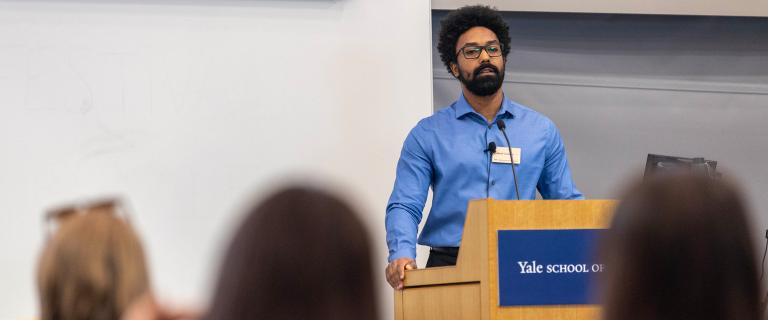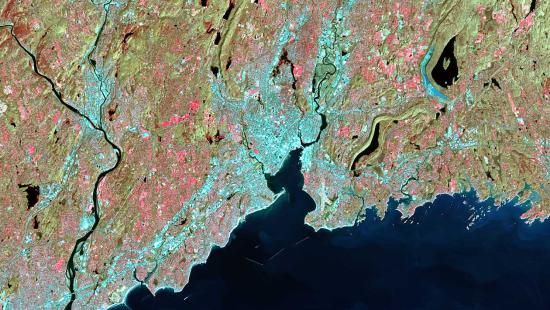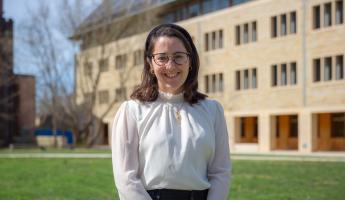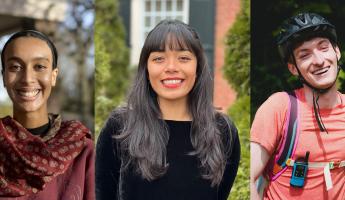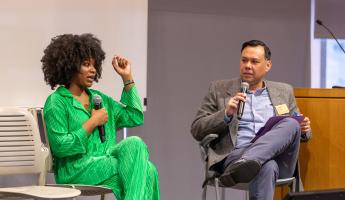As a wildlife and research technician, Gabriel Gadsden studied conflict, specifically how predators impact the behavior of animals through fear. He also encountered a similar pattern in the human world while working on energy justice issues, noticing how socio-economic disparities and narratives of violence have led to fear of neighborhoods. These observations during his master's studies research prompted him to reflect more deeply about how fear and conflict impacts scientific inquiry as a whole.
“How do we view a space?” he asks. “What are our preconceived ideas and how does that affect our research and our questions?”
When he entered Yale School of the Environment’s doctoral program, Gadsden continued to delve into these issues, publishing a paper in BioScience in January — Place-Based Bias in Environmental Scholarship Derived from Social-Ecological Landscapes of Fear — that examined bias in environmental inquiry. The research earned Gadsden the 2023 F. Herbert Bormann Prize, an award that honors a YSE doctoral student whose work best exemplifies the legacy of the late YSE professor. Bormann, a plant ecologist who taught at YSE from 1966-1993, called the world’s attention to the threat of acid rain in the 1970s.
Gadsden’s research proposes a new concept, “social-ecological landscapes of fear,” which states that certain places hold legacies derived from historical events that create bias and curtail scientific inquiry.
“Gabe’s work really shines a light on how negative human histories have impacted how ecologists perform their research and provided recommendations on how to correct these biases in our research moving forward,” says Peter Raymond, senior associate dean of research and doctoral studies and professor of ecosystem ecology.
Gadsden, who works in the Applied Wildlife Ecology (AWE) lab of Nyeema C. Harris, Knobloch Family Associate Professor of Wildlife and Land Conservation at YSE, says his interest in this issue is rooted in his own experiences growing up and visiting family in Philadelphia, where he is conducting doctoral research on rodents and spread of disease.
“There are specific areas of inefficient housing with low amounts of green space, areas that are forgotten about and looked down upon, whose full histories haven’t been told. There is this idea that the space is degraded and not worth our resources,” he says.
In nominating his work, Harris, a co-author of the study, says Gadsden challenges environmental scholars to reckon with biases in how and where research is conducted across ecosystems.
Newsletter
Biweekly, we highlight three news and research stories about the work we’re doing at Yale School of the Environment.
“He highlights the role of fear (conscious or unconscious) stemming from the historical legacies of trauma places hold that deter broad participation. He expands on the ecological concept of landscapes of fear applied often to prey avoidance of predators to apply a social lens of how fear governs study area locations, biasing the production of research,” Harris states in her nomination letter.
The study, which was also co-authored by Nigel Golden, a postdoctoral researcher at Woodwell Climate Research Center, recommends recognizing negative histories, including community perspectives, and collaborating with local environmental justice and political ecology scholars to overcome bias.
Gadsden will continue his research on this issue as part of his doctoral dissertation.
“This research is interdisciplinary. It sits at the nexus of many disciplines,” he says. “Landscapes are not just broad brushstrokes of one concept. We have to ask, why are these areas the way they are? We have to self-reflect. It reminds researchers to ‘check yourself.’”
Gadsden was presented with the Bormann Prize at YSE’s annual Research Day on April 14. Other award winners include doctoral student Jacob Peters, who earned the Schmitz Prize; Amaya Sathurusinghe ‘24 MFS and Jessie Wainer ’23 MESc, who were each awarded the Master’s Student Oral Presentation Prize; and doctoral student Joseph Zaillaa, who won the Best Poster Presentation award.
